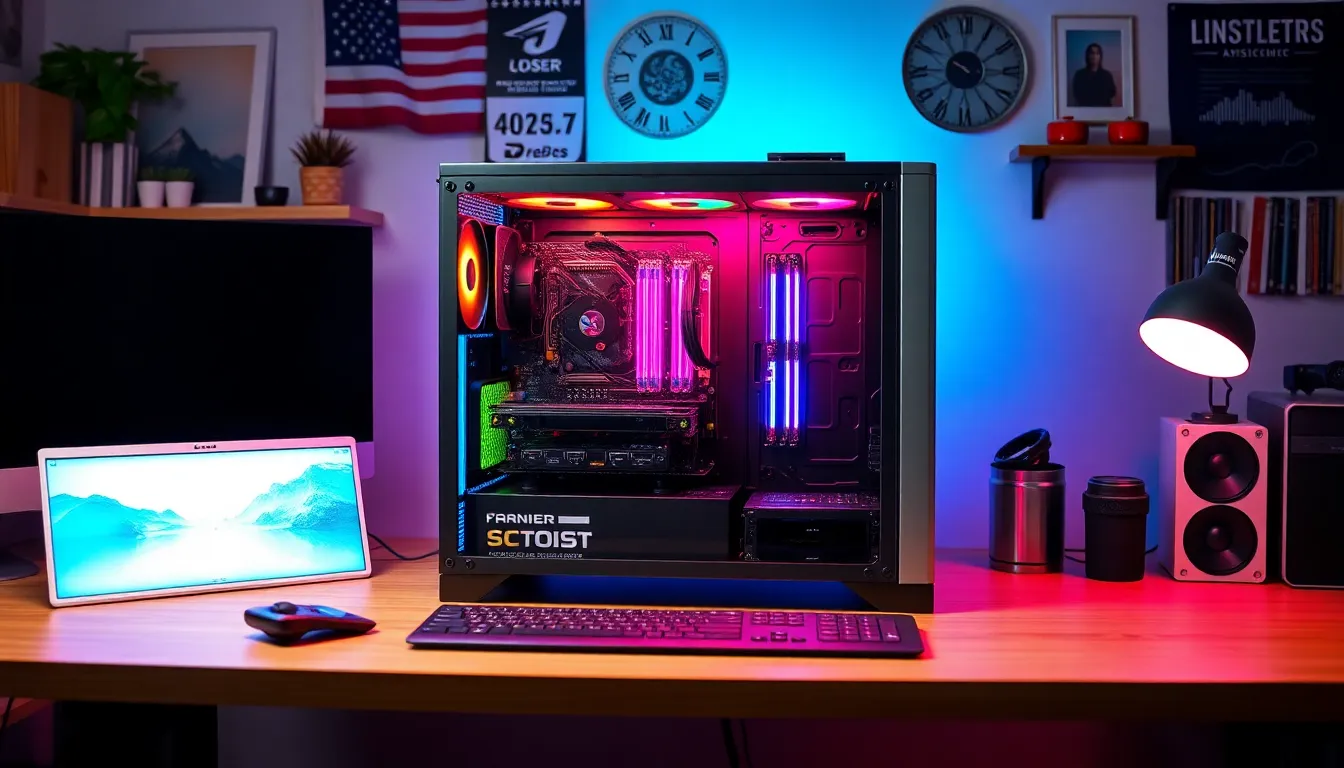In a world where technology evolves faster than a cat meme goes viral, modular computer cases are the unsung heroes of the PC building universe. They’re like the Swiss Army knives of computer hardware, offering flexibility and customization that even the pickiest tech enthusiast can appreciate. Imagine a case that adapts to your needs, whether you’re a casual gamer or a full-blown workstation wizard.
Table of Contents
ToggleOverview of Modular Computer Cases
Modular computer cases offer flexibility and ease of customization, catering to diverse user needs. These cases allow builders to rearrange components according to their preferences. Different configurations enable efficient airflow, improved cooling, and enhanced aesthetics.
Many manufacturers provide various panel options, enabling users to personalize their cases with unique designs or materials. Users can often mix and match parts, such as drive bays or fan mounts, to create optimal layouts. Some modular systems allow users to add or remove segments, accommodating upgrades without requiring a complete overhaul.
Many modular cases feature removable panels, providing easy access to components for maintenance or upgrades. Designers carefully craft these cases for convenient cable management and airflow efficiency. Specific models cater to high-performance setups, aiding in thermoregulation during intensive tasks.
Customization becomes straightforward with pre-drilled mounting points and adjustable drive cages available in many cases. The assemblage of various components also enhances compatibility, allowing for easy installation of both high-end and entry-level parts.
Craftsmanship varies, but many reputable brands use durable materials to ensure longevity. Clear acrylic or tempered glass panels are popular options, displaying interior components while providing structural integrity.
Overall, modular computer cases rank among the most adaptable solutions for PC builders. These cases foster creativity and practicality, proving essential in today’s evolving tech landscape. The balance of functionality and personalization aligns with modern computing demands and user experiences.
Benefits of Modular Computer Cases

Modular computer cases offer several advantages that cater to the diverse needs of users. Their design promotes flexibility and functionality while optimizing performance.
Enhanced Customization
Enhanced customization defines the modular computer case experience. Users can modify layouts, adding and removing compartments based on personal preferences. Many cases feature interchangeable panels, allowing for aesthetic updates and functional adjustments. Builders can tailor configurations to accommodate various components, ensuring compatibility and accessibility. Options for different materials, colors, and finishes enhance visual appeal significantly. Modular cases grant users the freedom to express individuality through personalized builds. Specific arrangements also allow for innovative setups, challenging conventional system designs.
Improved Cooling Solutions
Improved cooling solutions represent another key benefit of modular computer cases. Designers prioritize airflow efficiency by creating adaptable configurations for airflow management. Specific layouts enable users to optimize fan placement and radiator positioning. Various panel designs facilitate unobstructed air currents, reducing temperatures in critical components. Many cases support advanced cooling options, including liquid cooling setups, which further enhance heat dissipation. Effective cable management contributes to better airflow by minimizing clutter inside the case. Users can implement custom cooling strategies to match their unique system requirements, ensuring longevity and peak performance.
Popular Modular Computer Cases
Various modular computer cases attract builders for their design, functionality, and customization options. Below are reviews of two popular models on the market.
Case A Review
The NZXT H510 is a well-regarded modular case known for its minimalist design and effective airflow. Users appreciate its cable management features, which include pre-installed channels and straps that keep wires organized. Spacious interior accommodates various components, allowing for upgrades without difficulties. Each panel is easily removable, making assembly and maintenance straightforward. The case supports multiple cooling solutions, including space for additional fans and radiators. Builders find the tempered glass side panel adds elegance, showcasing a clean, organized build.
Case B Review
The Corsair 4000D Airflow stands out with its high airflow performance designed for optimal cooling. This modular case features a sleek front mesh panel that promotes exceptional airflow while maintaining aesthetic appeal. Interchangeable panels provide customization options, accommodating diverse preferences for interior layouts. The spacious design enables easy installation of larger graphics cards and cooling systems. Users consistently highlight the ease of building within this case due to its intelligent cable management features. Durability is ensured with high-quality materials, reflecting Corsair’s commitment to building reliable cases.
Considerations When Choosing a Modular Computer Case
Choosing a modular computer case requires attention to several important factors that can impact overall performance and user experience.
Size and Compatibility
Size plays a crucial role in determining the right modular computer case. He or she must consider component dimensions and ensure the case accommodates graphics cards, motherboards, and cooling solutions. Standard sizes include ATX, Micro-ATX, and Mini-ITX, each suited for different configurations. Compatibility with various hardware components ensures smooth assembly and prevents potential issues. Some cases feature adjustable mounting points or removable drive bays, allowing for an optimal fit. Users should also check the specifications of the case against those of their selected components to avoid frustration during installation.
Cable Management Features
Effective cable management features significantly enhance the aesthetics and functionality of a modular computer case. Thoughtful designs employ routes and channels to keep cables organized and out of sight. Many cases have built-in cable tie points to facilitate secure routing. Some modular options include removable panels, making access to components easier and simplifying upgrades. Good cable management contributes to improved airflow, which is essential for thermal performance. Users appreciate modular cases that offer flexible options, as they enable creative configurations tailored to individual setups.
Modular computer cases represent a significant advancement in PC building. Their flexibility and customization options cater to diverse user needs, making them ideal for both casual and professional setups. With features that enhance airflow and cooling, these cases not only improve performance but also allow for personal expression through design.
The ability to modify layouts and manage cables effectively contributes to a cleaner and more efficient workspace. As technology continues to evolve, modular cases stand out as practical solutions that adapt to changing requirements. For anyone looking to build or upgrade a PC, investing in a modular case can lead to a more enjoyable and tailored computing experience.


